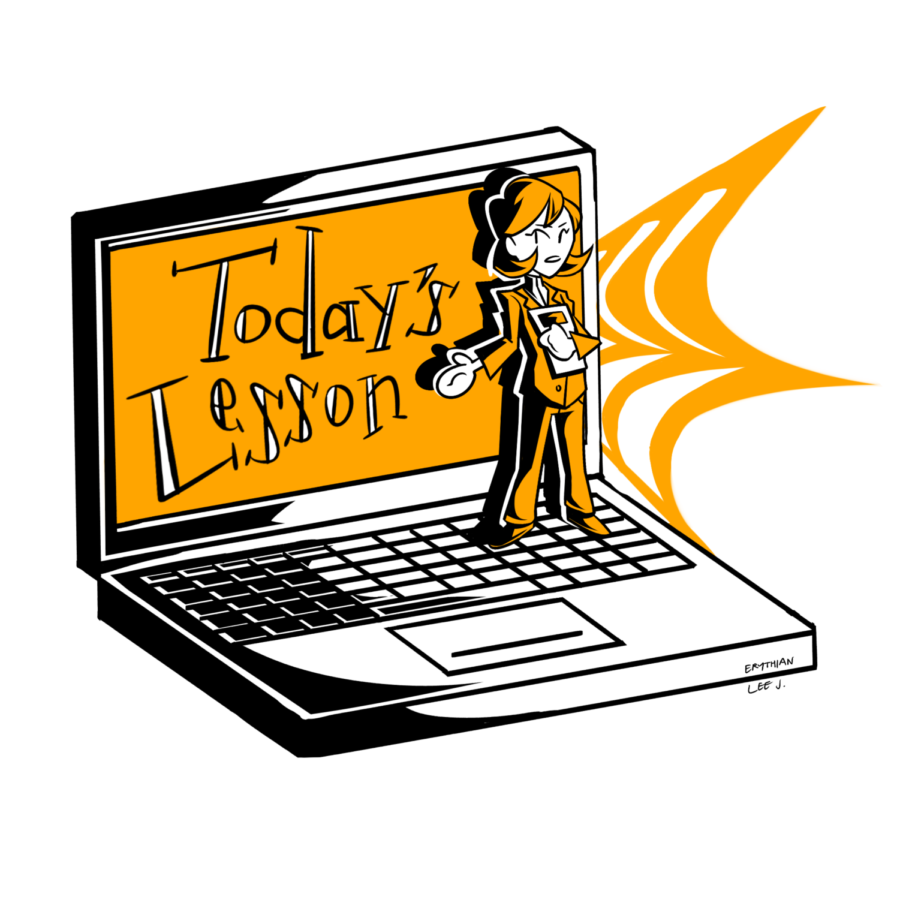LHS leads the blended learning pilot next year
On November 13, 2017, the District 128 Board of Education voted on course proposals for next year. LHS approved Blended Personal Finance, Consumer Management, Algebra II and Chemistry. VHHS did not propose any entirely blended classes.
Blended learning is a program where students receive online learning as well as in-class instruction from teachers. Students will go to class for a certain number of days, and then spend the rest of the week doing their assignments and learning online.
The weekly schedule at LHS will depend on the specific course, the teacher and the learning needs of the students.
Both schools were introduced to blended learning through a convention hosted by Huntley High School. After attending this convention, some Libertyville teachers and administration proposed the four blended courses. However, VHHS did not propose any official blended classes.
“There isn’t that interest here. We don’t have a professional who wants to necessarily take [blended learning] on. We’d be unwise to try something that no one wants to do, or force it on a teacher,” VHHS Principal Dr. Guillaume said.
Libertyville went through a curriculum proposal process where teachers, department supervisors and student surveys showed interest in blended learning courses.
“There was no problem we were trying to solve, but we did want to provide students with greater options for their learning experiences, and this was an exciting option for us to offer. We know that not all students will be interested in a blended experience, but we do believe that some students are very excited about this new course design,” Dr. Koulentes, LHS principal, said.
Teachers and administration have been discussing if blended learning is the right choice for Vernon Hills High School, as a smaller school. More complications would arise with scheduling and where to have these students when they’re not in class.
“I think for Vernon Hills, that’s something we haven’t identified: What is a problem that we have that we think blended learning will solve?” Guillaume said.
For classes like Chemistry, a blended approach would mean time not spent in labs.
“Our science department’s philosophy is that science is a hands-on learning class. It could probably work for other classes in some cases, but in science, I believe in the lab experience as often as possible,” Mr. Prosise, Science Department supervisor, said.
Blended classes will require a lot of responsibility and time management to be put upon the student. In college and future jobs, students will be expected to have these skills.
“One of the positives can be that it puts added responsibility on the student in a format that they [could] see in their future. A drawback could relate to difficulty in determining which students are ready for the added responsibility,” said Mr. Czarnecki, Math Department supervisor.
However, some teachers think high school is a time to prepare students for the greater responsibility they will see in the future.
“Reflecting on my own high school experience and relationships I had with students, the face-to-face time seems to be a key element in the development of a high school student. Although [blended learning] is much more of a collegiate practice, I think we’re still preparing kids for that. It’s an easier speed bump to get over with the teacher in the classroom,” Mr. Smith, English teacher, said.
Ms. Macias, English teacher, is currently teaching online English courses to students in China once a week. In her experience, human connection is very minimized by online teaching.
“For me, this virtual classroom has made teaching students on another continent possible. But after having taught three courses this way, I firmly believe that it’s not a really connected way to teach students. It solves some logistical issues that would arise, but it poses issues of losing the humanity of teaching,” Macias said.
Although not officially introducing a blended class, VHHS has plans for piloting a blended learning experience in Personal Finance classes next year. It will not take up the entire class, but will be at least one unit.
“We are giving it a try; we’re just doing it in a way that helps us to get some data and information about what it could be like here before we go and make an entire new class,” Ms. Benson, Career and Technical Education Department supervisor, said.
Next year will be the first year that our district introduces blended learning. Both schools are planning to observe, gather data, and tailor blended learning to their needs.
“Right now, we have no plans to move forward; we simply have plans to watch this, to assess this, and to determine what it’s pros and cons are, what’s best for our kids and our school,” Guillaume said.

